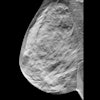Sunday, November 25 | 10:55 a.m.-11:05 a.m. | SSA01-02 | Room E450A
Digital breast tomosynthesis (DBT) is an effective screening tool in women with breast implants, researchers from MD Anderson Cancer Center in Houston have found.In this Sunday morning session, Dr. Ethan Cohen will present data from a study that compared the performance of digital mammography with DBT in women both with and without breast implants. The study included 103,070 screening mammograms acquired between February 2011 and June 2014; Cohen's group analyzed recall and cancer detection rates, as well as positive predictive values for recall (PPV1).
In women without implants, the researchers found a digital mammography recall rate of 8% and a DBT recall rate of 6.3%. Cancer detection rates in this group were 4.1 per 1,000 exams for digital mammography and 5.0 per 1,000 exams for DBT; the PPV1 was 5.1% for digital mammography and 8% for DBT.
In women with implants, Cohen's group found a digital mammography recall rate of 5.2% and a DBT recall rate of 4.1%. Cancer detection rates among women with implants were 1.8 per 1,000 exams for digital mammography and 2.7 per 1,000 exams for DBT. The PPV1 was 3.6% for digital mammography and 6.7% for DBT.
DBT improved the recall rate, cancer detection rate, and PPV1 for all women in the study, both with and without implants -- although the group noted statistically significant differences only for recall rates in all women and for PPV1 in women without implants.
"The benefit of tomosynthesis has been incompletely studied in screening mammography patients with implants," the researchers concluded. "Further study with larger populations is warranted."




















